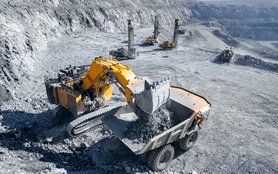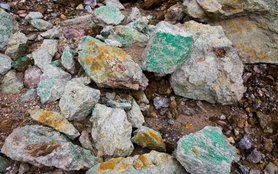Oxfam and civil society allies are closely monitoring the new United Nations panel that is meeting this week in Denmark
Pour lire ce blog en en français, cliquez ici click here
This week in Copenhagen, a new UN panel is meeting in person for the first time to discuss a topic essential to the energy transition. The UN Secretary General’s office’s decision to convene a global Panel on Critical Energy Transition Minerals (CETM) underscores the importance of the subject for humanity, and the planet on which we live. It also demonstrates how the management of natural resources for the good of people and the planet will require diplomacy, the rule of international law, as well as high and common standards of governance, justice, and corporate accountability.
“The race to net zero cannot trample the poor...but we must guide it towards justice”
For over a quarter century, Oxfam has worked alongside impacted communities to advance natural resource justice in the mining sector. The rush to secure minerals to advance the energy transition is putting Indigenous Peoples and frontline communities at risk. Our Recharging Community Consent research shows that unfortunately, mining companies are “not sufficiently ready to support a just energy transition under current company policies,” especially with respect to Indigenous Peoples’ and frontline communities’ rights. So we were encouraged by the words that UN Secretary-General António Guterres shared at the launch of the Panel in late April:
“A world powered by renewables is a world hungry for critical minerals…For developing countries, critical minerals are a critical opportunity -- to create jobs, diversify economies, and dramatically boost revenues. But only if they are managed properly. The race to net zero cannot trample over the poor. The renewables revolution is happening – but we must guide it towards justice.”
The UN CETM Panel seeks to “build trust between governments, local communities and industry, by addressing issues relating to equity, transparency, investment, sustainability and human rights.” It is comprised of 38 members in total; 24 countries and 14 other organizations, including international civil society organizations working across the minerals value chain. By building on existing standards and initiatives by the UN and other actors, the Panel seeks to strengthen standards and consolidate existing efforts into a “set of global common and voluntary principles to safeguard environmental and social standards and embed justice, in the energy transition”.
Civil society is leading the way
Oxfam has joined a range of civil society organizations in proposing recommendations for the Panel that will help ensure a transformative approach to transition minerals that contributes to a more just global energy system.
Together with the Natural Resource Governance Institute (NRGI) and Climate Action Network (CAN) International – both represented on the Panel – and over 40+ Indigenous Peoples groups, unions and labor activists, and climate, environmental justice, child rights and human rights organizations, we endorse these recommendations. The recommendations would help reduce mineral demand, protect people and the planet, and support equitable development, including through responsible tax policies and fairer trade.
Adopting our recommendations to implement these principles would help the Panel achieve its overall goal, and in particular, advance three of the Panel’s stated objectives.
In addition, the Panel is now welcoming written submissions from the public to advance its work via this public submissions page, open July 2-30.
Challenges in achieving the UN CETM Panel objectives
The Panel is working to a very tight timeline, and there are several areas in which it can be improved to be more representative and effective.
One of the Panel’s objectives is to support “a just and equitable transition to renewable energies.” This requires equitable participation of civil society stakeholders. However, the Panel has insufficient civil society representation. The absence of CSOs from Panel member countries where extraction takes place is a concern, particularly in light of the limited civic space within some of these countries. This means that local communities and Indigenous Peoples are less likely to be represented by their host states, and therefore the burden of representation and information falling on just two international NGOs is too heavy.
While we applaud efforts by NRGI and CAN International to broadly consult a range of civil society stakeholders in an effort to overcome this participation barrier, we nonetheless remain concerned that the lack of broader direct participation might also mean weaker standards. The Panel so far in its statements and objectives has made limited references to Indigenous rights, which is particularly problematic given several of the countries on the Panel itself have not ratified the ILO Convention 169. There are also limited references to other salient issues in the mining industry that require specialist and diverse civil society input, notably the management of tailings (mineral byproduct waste) and labor rights and representation. There are minimal references to gender, despite the extent of gender-based harms, discrimination, and inequity around mine sites and mineral value chains.
Another Panel objective puts important emphasis on value creation – particularly for developing countries – as mining, if well governed, can be an engine of development to lift millions out of socio-economic poverty, enhance the competitiveness of the country, and reduce vulnerability to economic shocks and commodity price fluctuations. However, far too often these benefits fail to materialize. Successful value creation and its benefit sharing will require transparency to ensure accountable revenue collection and allocation, which in turn requires long-term stakeholder engagement and trust. The panel must place emphasis on ensuring that countries develop strong institutions capable of accountable benefit sharing.
Of course, the development of the energy transition minerals value chain also presents dangers and risks to some local communities. These risks are particularly acute in countries where there are systemic threats to human rights defenders (HRDs) and Indigenous Peoples, including several countries on the Panel that have high rates of assassinations linked to the mining industry. Both governments and mining companies can do more to protect defenders.
There is also an urgent need to reduce the gap between countries and companies with varying levels of respect and implementation for human rights and environmental standards, which largely depends on the strength and integrity of governance institutions. The Panel also includes a stated objective around normative alignment and international cooperation, which is fundamental to ensuring adherence to common standards.
Initial discussions indicate that this would be achieved through the development of a new set of voluntary principles. It is imperative that the Panel not re-invent the wheel and draw from strong existing standards where possible, rather than provide opportunities for new standards to be less comprehensive. Even industry associations that had previously shown leadership on best practices in their standard-setting efforts now seem at risk of deviating from strong standards.
The movement for natural resource justice has come a long way since the first voluntary guidelines were set out by the OECD, the UN Guiding Principles, and the EITI Standard, and over the last two years became binding international instruments in key value chain due diligence legislation. The Panel should also place emphasis on countries demonstrating improvements in their natural resource governance over time.



